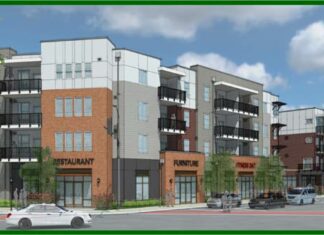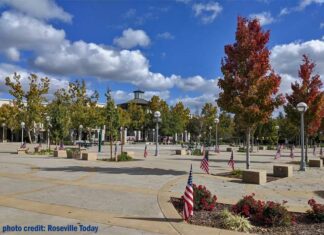Rocklin, Calif. – The Rocklin History Museum is open from 1 pm until 4 pm on Wednesday, Saturday and Sunday afternoons. If you are in the mood for Rocklin’s history at other times, try this 20 minute tour of two sites which were important to Rocklin’s role as the Sacramento Valley’s major producer of granite products in the late 19th and early 20th centuries.
Downtown Rocklin is astride high quality and easily accessible granite in a 100+ square mile eroded granite belt that extends from Folsom to Lincoln. The Rocklin area’s landscape includes 61 abandoned quarries. Many of these were opened in the 19th century to provide culvert stone and riprap for railroad construction and building blocks for California’s monumental buildings such as the State Capitol Building in Sacramento.
Start your tour by driving to the parking lot at the northwest corner of Rocklin Road and Granite Drive. The lake that you see there fills a quarry operated in the early 20th century by the Union Granite Company under the management of Finnish immigrant Matt Ruhkala. Business at Rocklin’s granite operations flourished in the 1890s and very early 20th century, but competition from cement-based concrete attenuated the industry’s growth after 1905. Nevertheless the Ruhkala quarry continued to produce granite curbing and stone for monuments until at least 1915. Later, Ruhkala operated two other quarries, one of which is now under the westbound lanes of Highway 80.
Next, look from the Ruhkala quarry to the south side of Rocklin Road. Ira Delano’s Rocklin Granite Company quarry was located there. Delano’s quarry was Rocklin’s largest and most financially successful 19th century quarry. Delano was possibly Rocklin’s wealthiest citizen. It was mostly his money that built Rocklin’s racetrack in the mid 1890s. In 1915 quarrymen struck the Rocklin quarries for a raise from $3.25 to $3.75 per day and closed most of Rocklin’s quarries permanently. Delano gave up his business and retired a year later.
Delano’s quarry pit served as Rocklin’s garbage dump during the mid 20th century and that dump now underpins the parking lot and motel in back of the Taco Bell.
Next, go to the east side of the Rocklin City Office Building at 3970 Rocklin Road and climb to the second floor landing of the exterior stairwell. The stairwell is to the left of the building’s entrance. Look south and you will see the sheer granite walls of the Big Gun quarry pit, a spectacular site.
The California Granite company, under the leadership of Finnish immigrant Adolf Pernu, acquired this quarry in the 1890’s and modernized its operations with pneumatic, steam and electric equipment in the early 20th century. Quarrying operations here survived the granite industry’s early 20th century downturn, but financial problems set in after Pernu died in a Yosemite quarry accident in 1929. Four of Ruhkala’s sons acquired the quarry in 1933 (Ruhkala had eleven children). They gave it the Ruhkala family’s Union Granite Company name, repaired the aging equipment, and produced monument stone, monuments, and crushed stone products here until 1978.
In 1968 Congressman ‘Bizz’ Johnson commended three of the Ruhkala brothers, Ben, Ruben and Abner, for producing 32 granite benches for the United States Capital grounds in Washington D.C. In the early 1970s the Ruhkalas imported quartz and crushed it to reinforce the concrete walls of the Transamerica building in San Francisco.
Recent owners gave the quarry the Big Gun name in the early 1990s but they did not extract significant amounts of stone. For countertops and monuments the light grey color of Rocklin’s granite cannot compete with the more colorful shades of granite available from elsewhere in California and from overseas. Granite processing operations ceased here in 2005.
Today, in 2007, the latest owner has optioned the quarry to a downtown Rocklin re-development company that is proposing to the city to preserve it as the centerpiece of a commercial venture.
Most of the information in this article is from State Geologic Survey records and from Ruben and Roy Ruhkala
(21+ years strong)
Welcome to the brighter side!
Get in front of local customers! 24/7 (365)





















